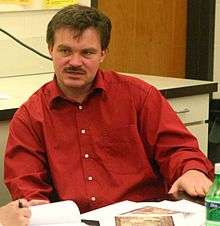Nikolai Grube
Nikolai Grube is a German epigrapher.[1] He was born in Bonn in 1962.[2] Grube entered the University of Hamburg in 1982 and graduated in 1985.[2] His doctoral thesis was published at the same university in 1990.[2] After he received his doctorate, Grube moved to the University of Bonn.[3] Nikolai Grube has been heavily involved in the decipherment of the Maya hieroglyphic script.[4]
Nikolai Grube | |
|---|---|
 Nikolai Grube at the 1994 Maya Meeting | |
| Born | 1962 |
| Occupation | Epigrapher Mayanist |
Biography
He has served as professor of anthropology and art history at both the University of Texas at Austin and the University of Bonn.[5] At the University of Bonn he has worked in the Seminar for Ethnology.[2] He has worked with several archaeological projects in the Maya region, including those at Caracol in Belize and Yaxha in the Petén Department of Guatemala.[5] He has also occupied a position at the University of Hamburg.[6] He is fluent in the Yucatec language of the modern Maya inhabitants of the Yucatán Peninsula of Mexico.[6] Nikolai Grube worked with Linda Schele in presenting hieroglyphic workshops for native Mayan speakers in Mexico and Guatemala.[7]
In the 1990s he visited Naachtun in Petén and recorded the inscriptions on the Maya stelae.[8] He is credited with deciphering the ancient name of the kingdom from the hieroglyphic inscription on Stela 1 at the city.[8] Grube, together with fellow epigrapher Simon Martin, proposed that Maya politics of the Classic Period were dominated by two so-called "superstates" ruled by the rival cities of Tikal and Calakmul.[9]
From 1992 to 1995 Grube received funding from Deutsche Forschungsgemeinschaft ("German Research Foundation") for a project investigating the oral traditions of the Cruzoob Maya of Mexico.[3] In 2010 Nikolai Grube served as one of the directors of the Interdisciplinary Latin America Center at the University of Bonn.[10] Nikolai Grube is co-editor of the Mexicon journal and is a consultant for the Mexican magazine Arqueología Mexicana ("Mexican Archaeology").[3]
Since 2014 Nikolai Grube is directing the project Text Database and Dictionary of Classic Mayan, which has a projected run-time of fifteen years.[11] It is housed in the Faculty of Arts at the University of Bonn and was established with funding from the North Rhine-Westphalian Academy of Sciences, Humanities and the Arts.[12] The goal of the project is to conduct computer-based studies of all extant Maya hieroglyphic texts from an epigraphic and cultural-historical standpoint, and to produce and publish a database and a comprehensive dictionary of the Classic Mayan language.
Notes
- Coe 1992, 1994, p.236.
- Houston et al 2001, p.486.
- Interdisciplinary Latin America Center at the University of Bonn (1) n.d.
- Coe 1992, 1994, p.236. Houston et al 2001, p.486.
- Martin, Simon; Nikolai Grube (2000). Chronicle of the Maya Kings and Queens: Deciphering the Dynasties of the Ancient Maya. London and New York: Thames & Hudson. ISBN 0-500-05103-8. OCLC 47358325., inside back cover.
- Coe 1992, 1994, p.228.
- Martin 1998.
- Reese-Taylor, 15 October 2010.
- Webster 2002, p.168.
- Interdisciplinary Latin America Center at the University of Bonn (2) n.d.
- Project information on the website of the Department of Anthropology of the Americas, University of Bonn. Accessed on March 31, 2015.
- Project information on the website of the North Rhine-Westphalian Academy of Sciences, Humanities and the Arts. Accessed on March 31, 2015
References
- Coe, Michael D. (1994) [1992]. Breaking the Maya Code. London: Thames & Hudson. ISBN 0-14-023481-0. OCLC 31288285.
- Houston, Stephen; Oswaldo Chinchilla Mazariegos; David Stuart, eds. (2001). The Decipherment of Ancient Maya Writing. University of Oklahoma Press. ISBN 978-0-8061-3204-4. OCLC 44133070.
- Interdisciplinary Latin America Center (1). "Nikolai Grube" (PDF) (in Spanish). Bonn, Germany: Interdisciplinary Latin America Center at the University of Bonn. Archived from the original (PDF) on 2011-07-19. Retrieved 2010-12-14.
- Interdisciplinary Latin America Center (2). "Board of Directors". Bonn, Germany: Interdisciplinary Latin America Center at the University of Bonn. Archived from the original on 2011-07-19. Retrieved 2010-12-14.
- Martin, Simon (22 May 1998). "Obituary: Linda Schele". The Independent. London: independent.co.uk. Retrieved 2010-12-14.
- Martin, Simon; Nikolai Grube (2000). Chronicle of the Maya Kings and Queens: Deciphering the Dynasties of the Ancient Maya. London and New York: Thames & Hudson. ISBN 0-500-05103-8. OCLC 47358325.
- Reese-Taylor, Kathryn (15 October 2010). "Naachtun: A Lost City of the Maya". BBC. Retrieved 2010-12-12.
- Webster, David L. (2002). The Fall of the Ancient Maya: Solving the Mystery of the Maya Collapse. London: Thames & Hudson. ISBN 0-500-05113-5. OCLC 48753878.
See also
- "Works of Nikolai Grube". Google Scholar.